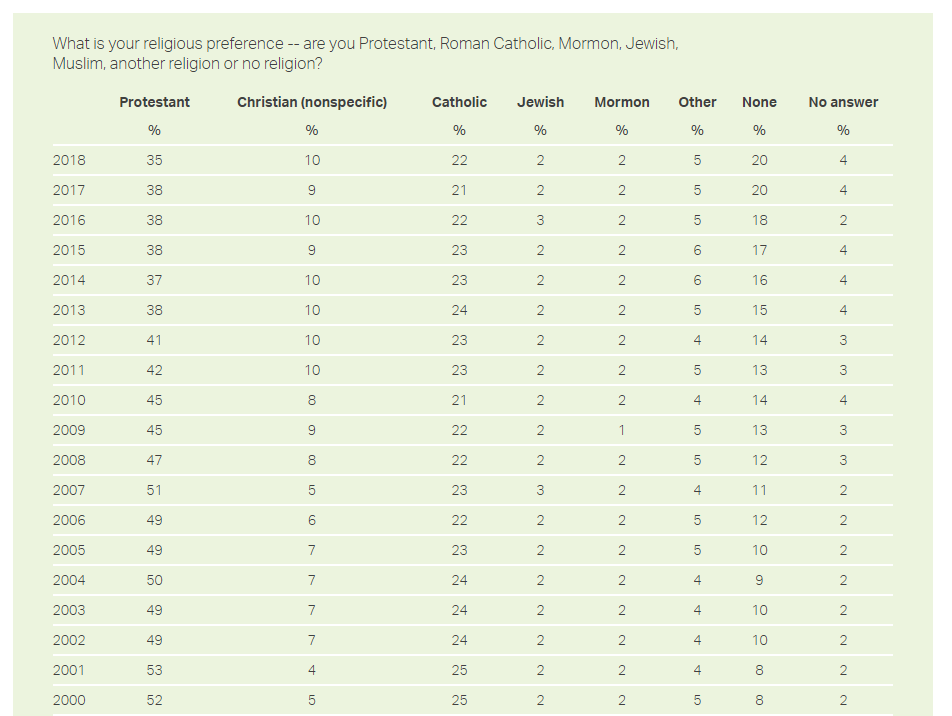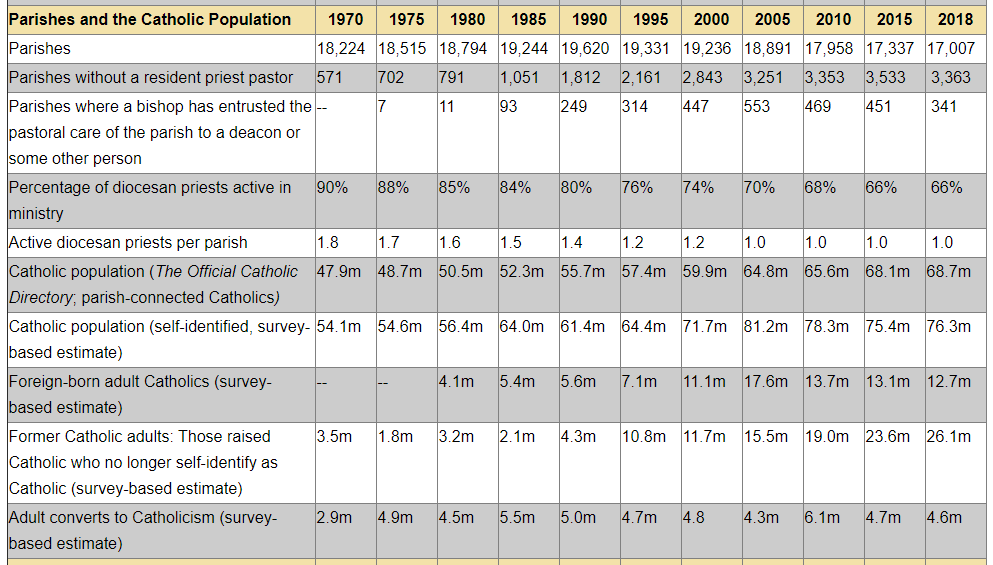The Long View 2007-04-23: Catholicism & Open Borders; Tolkein & Higher Loyalties
John J. Reilly wasn’t much amused by the trend toward de facto open borders in American Catholic thinking. It did not turn out to be true that this trend was directly imported into the American church by business interests. I suspect that for many people who argue this way, their motives are exactly as stated.
However, it seemed true in 2007, and still seems true now, that enthusiasm for immigration, consequences be damned, does cover up the fact that American Catholicism is hemorrhaging members as fast as any mainline Protestant denomination.

Courtesy of Gallup, the proportion of Americans who identify as Catholics is holding steady.
But according to the Center for Applied Research in the Apostolate at Georgetown, the increase in former Catholics over the last twenty years or so just happens to match the number of Catholics who have moved to America.

Catholicism & Open Borders; Tolkein & Higher Loyalties
About Open-Borders Immigration the readers of this blog already know what I think. Rather than repeat my views yet again, let me point out that this issue seems to be causing one of the great strategic errors in the history of American Christianity:
Too many Catholics believe myths surrounding immigration and immigrants based on misinformation and misconceptions requiring the Catholic Church to respond with a comprehensive fight against ignorance, said a U.S. bishops’ official...Mark Franken, executive director of the U.S. Conference of Catholic Bishops’ Migration and Refugee Services... ...“Our biggest challenge is not the attacks from the immigration restrictionists, the racists, or the xenophobes,” he said. “Our biggest challenge is ignorance!” ...More than 100 Catholic social-justice leaders, diocesan directors and others active in the USCCB Justice for Immigrants campaign gathered for the April 17 – 19 event, which included going to Capitol Hill and urging lawmakers to pass comprehensive immigration reform. The theme of the convening, which drew participants from more than 65 U.S. dioceses and more than 35 states, was “Offering Hope, Promoting Justice"....
Launched in 2005, the Justice for Immigrants: A Journey of Hope campaign was created to unite and mobilize Catholic institutions and individuals in support of a broad legalization program and comprehensive immigration reform. Its goal is to maximize the church’s influence on the issue toward passage of legislative and administrative governmental reforms and to organize Catholic networks to assist qualified immigrants to obtain the benefits received from those reforms. About 80 U.S. Catholic dioceses have formally launched the campaign locally, with most of the others actively engaged in its promotion.
A word to the wise: every penny for this effort better be coming from the people in the pews. If it turns out that this is sponsored, whether directly or through fronts, by agribusiness and the hospitality industry, then there could be the most awkward consequences.
* * *
When deceased writers continue to publish, it's usually a bit disconcerting, though we have come to expect such behavior of Heinlein (and I keep expect Lafferty to appear on CNN: he was always a bit cavalier about this mortality business). In any case, JRR Tolkien has a new book out, with a little help from his son Christopher as editor and redactor: The Children of Hurin. That Spengler at Asia Times has favored us with a review, the gist of which is that the rise and fall of Turin, the son of Hurin, is a cautionary tale about the ethical limits of nationalism. Spengler then relates this moral to a theory of history:
Tolkien's popular Ring trilogy, I have attempted to show, sought to undermine and supplant Richard Wagner's operatic Ring cycle, which had offered so much inspiration for Nazism...With the reconstruction of the young Tolkien's prehistory of Middle-earth, we discern a far broader purpose: to recast as tragedy the heroic myths of pre-Christian peoples, in which the tragic flaw is the pagan's tribal identity. Tolkien saw his generation decimated, and his circle of friends exterminated, by the nationalist compulsions of World War I; he saw the cult of Siegfried replace the cult of Christ during World War II. His life's work was to attack the pagan flaw at the foundation of the West....In The Lord of the Rings, Tolkien returned to this theme of faith in a higher power rather than in one's own force of arms. It is not the valor of the small remnant of free peoples that overcomes Sauron (Morgoth's successor) but rather the improbable mission of the Ringbearer that will overcome the Darkness that threatens Middle-earth.
Is this simply a matter of faith in a higher power, or also of higher loyalties? Consider what Mark Steyn had to say about the Nicholas Hytner's new production of Henry V:
Hytner himself belongs to one of these alternative elites, the holder of a state-funded job at a state-funded theatre and one which ex officio commands a knighthood from his Sovereign. It also ex officio requires a kind of doctrinaire counter -tribalism that Shakespeare would have found incredibly tedious...Shakespeare wasn’t pro-war or anti-war, but pro-chivalry in war, and opposed to breaches of that code. That argument finds support in the play. In Shakespeare’s time as throughout human history, war was a fact of life. What matters is how you conduct it. The Bard would have been all for enforcing the Geneva Convention, but not marching through the street bellowing “No blood for oil.”
Chivalry is what a genuine global patriotism would look like, I think.
Copyright © 2007 by John J. Reilly
Support the Long View re-posting project by downloading Brave browser. With Both Hands is a verified Brave publisher, you can leave me a tip too!



Comments ()